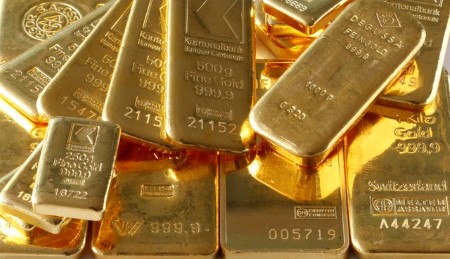




January Economic Update: Growth slows, prices rise
 DOWNLOAD
DOWNLOAD

Inflation Update: Up, up, and away?
 DOWNLOAD
DOWNLOAD

Quarterly Economic Growth Release: Growth takes on a slower pace
 DOWNLOAD
DOWNLOAD


Gold set for first weekly rise in five on dollar weakness

March 3 (Reuters) – Gold prices climbed to a two-week high on Friday and were heading for their first weekly rise in five as a pullback in the US dollar and Treasury yields offered some respite from prospects of more rate hikes from the Federal Reserve.
Spot gold was up 0.8% at USD 1,850 per ounce by 02:28 p.m. ET (1928 GMT), its highest since Feb. 15. Prices have risen about 2.2% so far this week.
US gold futures settled 0.8% higher at USD 1,854.60.
Until a new catalyst is found, such as next week’s jobs or consumer prices data, gold is likely to remain range-bound between the USD 1,830-USD 1,850 levels, Bart Melek, head of commodity markets strategy at TD Securities, said.
With China recovering, there may be continued robustness in gold consumption, with people also buying the metal to hedge against inflation, Melek added.
The US dollar index was headed for its first weekly loss in five, making bullion more attractive for other currency holders, while benchmark US 10-year yields crept lower from near a four-month peak.
While Fed Governor Christopher Waller said strong economic data could see rates above the 5.1%-5.4% range, Atlanta Fed President Raphael Bostic said he favoured a “slow and steady” increase moving forward and a pause by mid or late summer.
Traders are now pricing in at least three more 25 basis point rate hikes this year, with rates peaking at 5.43% by September.
Despite gold being often seen as an inflation hedge, rising interest rates increase the opportunity cost of holding zero-yielding bullion.
Should support for gold at USD 1,780-USD 1,800 break over the next few weeks, it could be due to a more hawkish shift in US monetary policy, Craig Erlam, senior market analyst at OANDA, wrote in a note.
Spot silver gained 1.3% to USD 21.15 per ounce and was set for its biggest weekly increase since January. Platinum jumped 1.6% to USD 976.98, while palladium rose 0.2% to USD 1,452.20.
(Reporting by Seher Dareen in Bengaluru; Editing by Jan Harvey and Krishna Chandra Eluri)
This article originally appeared on reuters.com





 By Reuters
By Reuters